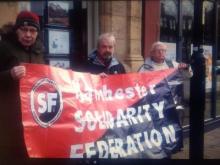Fox & Sons dispute: money-grabbing agency withholds £720 compensation payment
Our public dispute with Fox & Sons has continued into the new year, with the agency still failing to adequately compensate six former tenants who they left homeless five days after their tenancy was supposed to start. This failure has been made starker through the revelation that Fox & Sons demanded £720 compensation from the property company, Jears Properties Limited, that own the house the tenants were to move in to.







